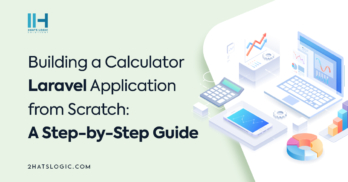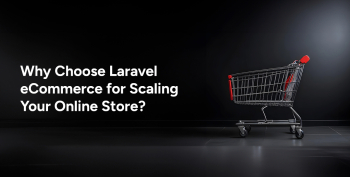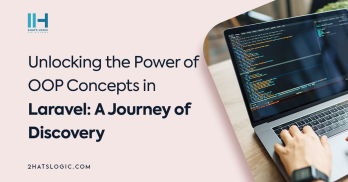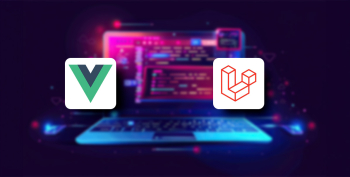Greetings! I'm Aneesh Sreedharan, CEO of 2Hats Logic Solutions. At 2Hats Logic Solutions, we are dedicated to providing technical expertise and resolving your concerns in the world of technology. Our blog page serves as a resource where we share insights and experiences, offering valuable perspectives on your queries.
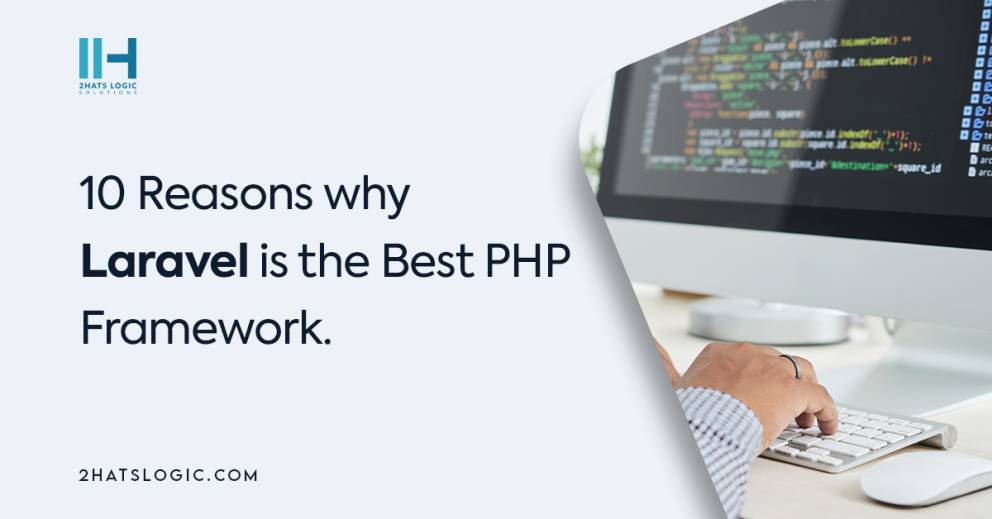
Choosing the correct framework for your web application is one of the most challenging components of the project’s early phases. Although the most common considerations for a development team to choose the framework are – the cost of development, their expertise with it, the popularity of the framework, and so on – there are several other factors that require deliberate consideration, such as third-party integrations, deployment, testing, and more.
With regard to all these mentioned considerations and factors, PHP being one of the oldest web development languages is equally popular in demand with Laravel being its most preferred framework.
Laravel, Symfony, CodeIgniter, Yii 2, Phalcon, CakePHP, Zend, Slim, and other frameworks with significant technical capabilities are available for the PHP scripting language. Nonetheless, Laravel remains the premier PHP MVC framework.
If you are wondering why, we will be discussing it in detail in this blog.
What is Laravel?
First, let us take a quick dive into what Laravel is.
A framework is a piece of reusable software created to assist developers in the creation of their applications in the domain of software development. It provides particular functionality that may be used in any program to increase capabilities and performance. As a result, the goal of a software framework like Laravel is to keep developers from reinventing the wheel by providing ready-made solutions. The complexity of these solutions ranges from assisting in easing common chores such as routing, authentication, sessions, and caching to delivering sophisticated tools required for vast and comprehensive application development.
Taylor Otwell created and maintains Laravel, an open-source PHP web framework, as an attempt to give a more complex alternative to the CodeIgniter framework. Its architectural patterns are heavily influenced by Symfony. Laravel is used to create web apps and APIs. It provides a suite of tools and capabilities that make it easier for developers to swiftly and efficiently build strong and scalable web applications. This framework gained popularity following the introduction of version 3, which added capabilities such as the Artisan Command Line Interface, database support, and migrations. It also introduced the bundles packing system.
Laravel is exactly what the term “framework” implies. Laravel has introduced a variety of benefits to the table and has steadily gained traction since then. With over 60k ratings on GitHub, Laravel is the most well-known PHP framework. Meanwhile, Symfony, the second most popular PHP framework, has barely a third as many stars despite being released four years earlier. Not to mention CodeIgniter, whose source has only been starred 18k times, and other PHP frameworks that are becoming less popular. Thus, Laravel’s current status implies that it has evolved into a go-to framework for web developers all around the world.
10 reasons why Laravel is the Best PHP Framework
Now to move on to why Laravel is the best PHP framework, below we have listed 10 major reasons as to why Laravel PHP frameworks are the best choice for your web development, it also explains what majorly Laravel is used for.
MVC Support
The first and most important benefit of utilizing the Laravel framework is that it adheres to the Model, View, and Controller architectural pattern and has an expressive and elegant syntax that makes it object-oriented.
Built-in Authentication
Laravel includes an Authentication and Authorization system configuration out of the box. That is, your application will be equipped with secure Authentication and Authorization with just a few artisan instructions.
Multiple File system
Laravel also has support for cloud storage systems like Amazon S3 and Rack Space Cloud Storage, as well as local storage. Because the API for each system is the same, switching between different storage alternatives is really straightforward. All three technologies can be used in one application to serve files from multiple locations, as in a distributed environment.
Effective ORM
Laravel’s built-in ORM implementation is the Eloquent ORM. In comparison to other frameworks, Laravel offers the best Object-Relational Mapper. This object-relational mapping allows you to use expressive syntax to interact with your database objects and database relationships.
Packaging System
A packaging system handles the many auxiliary applications or libraries that assist the web application in automating the process. As a dependency manager, Laravel employs a composer, which manages all of the information required to handle packages. Packages are a terrific approach to speed up development by providing the functionality we require right out of the box. Some of the top Laravel packages are Image, Laravel Debug Bar, and Laravel IDE Aid.
Events and Broadcasting
Laravel contains a notion called broadcasting that may be used in current online applications to incorporate real-time data, present live feeds, and so on. Broadcasting allows you to share the same event name on the server and client sides, allowing you to pull real-time data from the application.
Templates Engine
Laravel has a template engine called Blade Template Engine. The Blade templating engine combines one or more templates with a data model to generate views, converting the templates into cached PHP code to increase performance. Blade also has its own control structures, such as conditional statements and loops, which are internally mapped to their PHP equivalents.
Task Scheduling
The Scheduler command-line utility, added in Laravel 5.0, allows programmable scheduling of frequently run tasks. The scheduler internally relies on the cron daemon to run a single Artisan job, which then executes the defined tasks.
Artisan Console
Artisan is the name of Laravel’s command line interface. Artisan is commonly used for publishing package assets, database migration management, and seeding and producing boilerplate code for new controllers, models, and migrations. This functionality relieves the developer of the burden of building suitable code skeletons. Artisan’s functionality and capabilities can be expanded by introducing new custom commands.
Testing
When it comes to testing the application, Laravel provides the unit test by default, which contains tests that detect and prevent regressions in the framework. It is quite simple to integrate a PHP unit, such as a testing framework, into a Laravel application. Additionally, unit tests can be run using the artisan command-line utility.
Conclusion
Laravel’s MVC pattern support, object-oriented libraries, command-line interfaces, powerful templating engine, built-in ORM implementation, streamlined unit testing, route protection, and focus on security in software design are just a few of the features that make it one of the best PHP frameworks for websites and web apps.
If all of this sounds compelling to you, we propose that you carefully explore this concept and, keeping the items mentioned above in mind, hire the most experienced and competent Laravel developers for your project.
FAQ
Can Laravel handle high-traffic websites and scalability?
Yes, Laravel is designed to handle high-traffic websites and offers features for scalability. It supports caching mechanisms, queue management, and database scaling techniques, allowing developers to optimize performance and ensure smooth operations, even under heavy loads.
Is Laravel suitable for beginners or developers new to PHP?
Yes, Laravel is beginner-friendly and an excellent choice for developers new to PHP. Its elegant syntax, comprehensive documentation, and intuitive features make it easy to learn and get started with. Laravel's supportive community and extensive online resources further contribute to a smooth learning curve for beginners.
Can Laravel be used for RESTful API development?
Absolutely. Laravel provides excellent support for building RESTful APIs. It includes tools and features like routing, middleware, and data transformation capabilities that simplify API development and help create robust and scalable API endpoints
Can Laravel be used for e-commerce applications?
Certainly. Laravel is a suitable choice for developing e-commerce applications. Its flexibility, robustness, and extensive package ecosystem enable developers to build secure and feature-rich online stores. Additionally, Laravel's integration capabilities with payment gateways, inventory management systems, and other e-commerce tools make it a reliable framework for building scalable and efficient e-commerce solutions.

Related Articles


